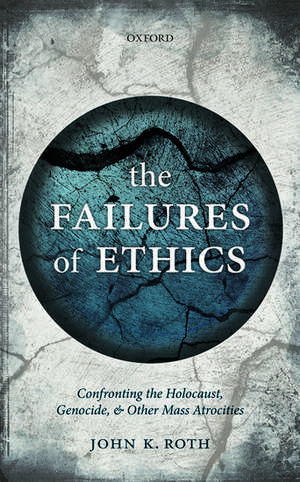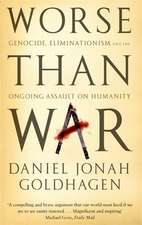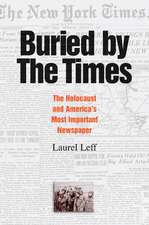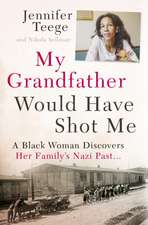The Failures of Ethics: Confronting the Holocaust, Genocide, and Other Mass Atrocities
Autor John K. Rothen Limba Engleză Hardback – 30 iul 2015
| Toate formatele și edițiile | Preț | Express |
|---|---|---|
| Paperback (1) | 169.72 lei 31-38 zile | |
| OUP OXFORD – mar 2018 | 169.72 lei 31-38 zile | |
| Hardback (1) | 297.22 lei 31-38 zile | |
| OUP OXFORD – 30 iul 2015 | 297.22 lei 31-38 zile |
Preț: 297.22 lei
Nou
Puncte Express: 446
Preț estimativ în valută:
56.87€ • 59.38$ • 47.07£
56.87€ • 59.38$ • 47.07£
Carte tipărită la comandă
Livrare economică 24-31 martie
Preluare comenzi: 021 569.72.76
Specificații
ISBN-13: 9780198725336
ISBN-10: 0198725337
Pagini: 288
Dimensiuni: 147 x 222 x 23 mm
Greutate: 0.48 kg
Editura: OUP OXFORD
Colecția OUP Oxford
Locul publicării:Oxford, United Kingdom
ISBN-10: 0198725337
Pagini: 288
Dimensiuni: 147 x 222 x 23 mm
Greutate: 0.48 kg
Editura: OUP OXFORD
Colecția OUP Oxford
Locul publicării:Oxford, United Kingdom
Recenzii
The best parts of The Failures of Ethics reflect Roth's acute sense of the moral implications and demands of his field.
Roth's philosophical contribution to attempting to understand the Holocaust and its implications is impressive not only in his productivity, but in his scope. His diverse interests are signalled in the important plurality of his book's title: there are multiple failures and therefore multiple ways in which to think about how they might be countered.
[A] significant resource on Holocaust and genocide scholarship. The book is Roth's recent contribution to ... his staggering body of research on the Holocaust. The Failures of Ethics will be suitable to university professors, students, and researchers interested in the subject of the Holocaust and genocide. The book embodies a very rich review of important research and scholarship on the Holocaust, and contributes enormously to the debates on the discourse of ethical practices and dispositions that emerged in the Holocausts aftermath
Everything John K. Roth writes is thoughtful, measured, and insightful, and so is this deeply disturbing yet hopeful book. Part intellectual autobiography, part philosophical treatise, and part call to action in dark times, The Failures of Ethics deserves and will reward a wide readership.
John K. Roth has joined the issue of historical scholarship with a consideration of ethical discourse and of the inability of that discourse to remain the same in the presence of such anti-human events. His focus on racism and tribalism is pivotal. Roth is boldly willing to challenge himself and others most especially as he confronts the failures of ethics - and overcoming those failures. His style invites engagement -- insists on engagement and dialogue and unlike many philosophers -- dare I say most -- his insights are both profound and accessible.
The publication of John K. Roth's The Failures of Ethics is an occasion for rejoicing--not in the failures of ethics but in Roth's profound realization that those failures matter. Eloquent, insightful, and deeply personal, Roth's reflection resonates with anyone whose soul hungers for meaning. For those who would embrace the ethical in an age haunted by nihilism and despair, reading this book is a matter of ethical responsibility.
The Failures of Ethics by John K. Roth, one of America's preeminent scholars and educators, reflects more than 40 years of scholarship, thinking, and teaching about the Holocaust and other genocides of the 20th and 21st centuries. Thoughtful, provocative, and elegantly written, it is a book educators and students alike should read, ponder, discuss, and learn from, but only if they are willing to confront questions with no easy answers.
The Failures of Ethics is a testimonial to Roth's extensive research and analysis about a topic with significant implications for humanity's survival. This masterful book/textbook offers a critical exploration of the vulnerability of ethics and why genocide remains a persistent possibility for vulnerable groups and cultures.
John Roth's The Failures of Ethics is anything but a resigned, world-weary confession of helplessness before the iniquities of the Holocaust and other terrible wrongs. To the contrary, this latest book by one of America's senior and widely respected Holocaust scholars is a resolutely ethical reflection on his four decades of scholarship and teaching in the field, looking back over his professional and pedagogical confrontations with some of the most vexing questions of our times.
Roth's philosophical contribution to attempting to understand the Holocaust and its implications is impressive not only in his productivity, but in his scope. His diverse interests are signalled in the important plurality of his book's title: there are multiple failures and therefore multiple ways in which to think about how they might be countered.
[A] significant resource on Holocaust and genocide scholarship. The book is Roth's recent contribution to ... his staggering body of research on the Holocaust. The Failures of Ethics will be suitable to university professors, students, and researchers interested in the subject of the Holocaust and genocide. The book embodies a very rich review of important research and scholarship on the Holocaust, and contributes enormously to the debates on the discourse of ethical practices and dispositions that emerged in the Holocausts aftermath
Everything John K. Roth writes is thoughtful, measured, and insightful, and so is this deeply disturbing yet hopeful book. Part intellectual autobiography, part philosophical treatise, and part call to action in dark times, The Failures of Ethics deserves and will reward a wide readership.
John K. Roth has joined the issue of historical scholarship with a consideration of ethical discourse and of the inability of that discourse to remain the same in the presence of such anti-human events. His focus on racism and tribalism is pivotal. Roth is boldly willing to challenge himself and others most especially as he confronts the failures of ethics - and overcoming those failures. His style invites engagement -- insists on engagement and dialogue and unlike many philosophers -- dare I say most -- his insights are both profound and accessible.
The publication of John K. Roth's The Failures of Ethics is an occasion for rejoicing--not in the failures of ethics but in Roth's profound realization that those failures matter. Eloquent, insightful, and deeply personal, Roth's reflection resonates with anyone whose soul hungers for meaning. For those who would embrace the ethical in an age haunted by nihilism and despair, reading this book is a matter of ethical responsibility.
The Failures of Ethics by John K. Roth, one of America's preeminent scholars and educators, reflects more than 40 years of scholarship, thinking, and teaching about the Holocaust and other genocides of the 20th and 21st centuries. Thoughtful, provocative, and elegantly written, it is a book educators and students alike should read, ponder, discuss, and learn from, but only if they are willing to confront questions with no easy answers.
The Failures of Ethics is a testimonial to Roth's extensive research and analysis about a topic with significant implications for humanity's survival. This masterful book/textbook offers a critical exploration of the vulnerability of ethics and why genocide remains a persistent possibility for vulnerable groups and cultures.
John Roth's The Failures of Ethics is anything but a resigned, world-weary confession of helplessness before the iniquities of the Holocaust and other terrible wrongs. To the contrary, this latest book by one of America's senior and widely respected Holocaust scholars is a resolutely ethical reflection on his four decades of scholarship and teaching in the field, looking back over his professional and pedagogical confrontations with some of the most vexing questions of our times.
Notă biografică
John K. Roth is the Edward J. Sexton Professor Emeritus of Philosophy and the Founding Director of the Center for the Study of the Holocaust, Genocide, and Human Rights (now the Mgrublian Center for Human Rights) at Claremont McKenna College. In addition to service on the United States Holocaust Memorial Council, he has published hundreds of articles and authored, co-authored, or edited more than fifty books, including Approaches to Auschwitz, Ethics During and After the Holocaust, and The Oxford Handbook of Holocaust Studies. He has been Visiting Professor of Holocaust studies at the University of Haifa, Koerner Visiting Fellow at the Oxford Centre for Hebrew and Jewish Studies, and Ina Levine Invitational Scholar at the Center for Advanced Holocaust Studies, United States Holocaust Memorial Museum. In 2012 he received the Holocaust Educational Foundation's Distinguished Achievement Award for Holocaust Studies and Research.














